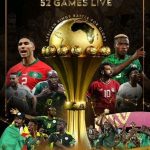
Photo credit: Eurosport
The African Cup of Nations (AFCON) is a biennial international men’s football tournament organized by the Confederation of African Football (CAF). It is the most prestigious national team competition in Africa and features the top African footballing nations.
While some countries have qualified for the 2024 edition held in Cote d’Ívoire, others will know their fate in the last games of the qualifiers.
Though the next African Cup of Nations will be held in January-February 2024 in Cote d’Ivoire where Nigeria and other countries have so far qualified. Interestingly, preparations have begun at the earliest as many countries have intensified the modality of winning the Mundial.
Apart from Nigeria and Cote d’Ivoire which have qualified for the tournament, other countries that have also booked their slots include holders of the cup Senegal and Guinea-Bissau. Others are Cape Verde Islands, Mali, Tunisia, Algeria, Burkina Faso, Egypt, Zambia, Equatorial Guinea, South Africa, and Morocco.
Nigerian and Guinea-Bissua qualified from Group A while Cape Verde made it through from Group B. Mali topped Group G and qualified in grand Style for the finals in Cote d Ívoire.
Morocco has also booked her qualification for the 2024 championship. The qualifiers of the AFCON 2024 were in the form of teams divided into twelve groups with four teams each. As it has been with the past AFCON qualifiers, the top two teams in each group are qualified to participate in the final tournament.
And with few teams still awaiting their qualifications from the group stage, three matches will be played in the June international break, while the final qualification rounds will take place in September.
Relevance of the African Cup of Nations
The African Cup of Nations (AFCON) holds significant relevance on various levels:
Promoting African Football:
AFCON highlights the footballing talent and passion that Africa possesses. It provides a platform for African players to represent their countries and display their skills on an international stage. The tournament attracts global attention, helping to raise the profile of African football and its players.
Unity and National Pride:
AFCON fosters a sense of unity and national pride among African nations. The tournament brings people together, igniting a spirit of support and enthusiasm for their respective national teams. It serves as a unifying factor, transcending borders and differences, and promoting a sense of solidarity among African countries.
Sports Diplomacy:
AFCON plays a role in sports diplomacy by facilitating cultural exchange and fostering positive relationships between African nations. The tournament provides an opportunity for countries to engage in friendly competition, promoting mutual respect and understanding. It can contribute to strengthening diplomatic ties and building bridges between nations.
Economic Impact:
Hosting AFCON can have a significant economic impact on the host country. The tournament attracts tourists, generates revenue from tickets sold and hospitality services, and boosts local businesses. It also provides an opportunity to showcase the host country’s infrastructure and attract investment.
Player Development and Exposure:
AFCON serves as a platform for young and aspiring African players to gain exposure and catch the attention of scouts from international clubs. Performing well in the tournament can open doors to professional opportunities and help in football talent development in Africa.
African Football Development:
AFCON contributes to the growth and development of football in Africa. The tournament encourages investment in grassroots football programmes, infrastructure development, and coaching initiatives. It helps raise the overall standards of African football and contributes to the continent’s competitiveness on the global stage.
Cultural Celebration:
AFCON celebrates the rich diversity and culture of Africa. The tournament provides an opportunity to highlight African traditions, music, and vibrant fan culture. It offers a platform to celebrate African heritage and highlights the continent’s contributions to the world of football.
Overall, the African Cup of Nations holds great relevance in promoting African football, fostering unity and national pride, contributing to economic growth, and showcasing the cultural diversity of the continent. It plays a crucial role in the development and recognition of African football both within the continent and internationally.
What is your thought on this story?
Kindly like and share now.





















